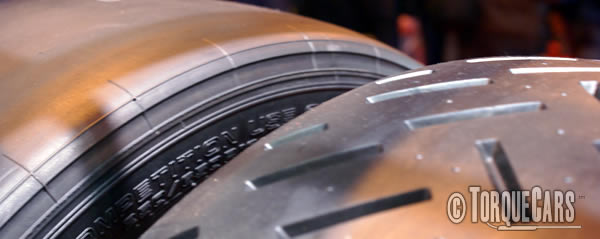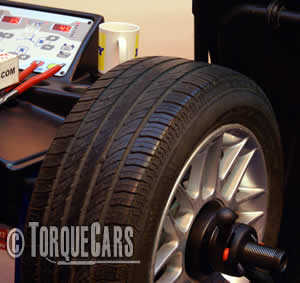Performance tyres, selection and tyre tread patterns.
"If you're feeling tyred!"
The importance of your cars tires should never be overlooked. A cheap tyre (NB:UK Spelling, USA - Tires!) can reduce your ability to corner on a dry surface by as much a 10-20 mph. In the wet this difference can be much much greater. Most performance tyres are best in the dry but there are some good all round tyres.
So how do you select a good high performance tyre? Which tread patterns work well and what considerations are there in choosing a new set of tyres?

Ideally (in a perfect world) you should have a dry and wet weather set of tyres (Tires) and change them in the morning – realistically for the Northern Hemisphere you should bias toward wet weather tyres (Tires) . Soft racing spec tyres give the best grip but wear very quickly. A directional ‘v’ tread pattern seems to give me the best compromise between driving in the wet and dry.
Asymmetric tread is designed with a different pattern for each corner of the car to maximise control although they all need replacing at the same time and some cannot be transferred front to back or axle to axle.
Modern cars come with recommended tyres (not just sizes but makes and models) – stick to these and you will be ok. Never have different tyres on the same axle. New tyres should generally go on the rear to prevent over steer problems and try to get the same or very similar tread patterns for the front and rear.
Bear in mind that tyres tested as the best on track could be the worst on road. Tracks are smooth and our roads are full of ruts and potholes the tyre may bounce or just create a harsh and noisy ride (my recent tyre change stopped most of the annoying in car rattles I was getting!)

Tyre pressures also have a profound effect on handling – keep them up to the manufactures recommended pressures for the speeds you are driving at and the car will handle predictably and the tyres will last. Check them visually every day and check pressure weekly.
Regular loss of pressure can be caused by a puncture, a faulty valve, a split in the wall of the tyre or heavy driving so get a suspect tyre checked properly. Driving with the wrong tyre pressures is as illegal and dangerous as driving with under the minimum tread depth.

The wheel should also be balanced (I recommend yearly as the tyre tread wears down and the alloy receives little knocks and scrapes). To maintain full control over the car and optimum life of tyres and brakes you must get all wheel checked and balanced. The wobble of a wheel at high speeds can also damage other components near the wheel like brakes and suspension so get it checked properly.
The best grip in the dry comes from a slick tyre, one with no tread pattern whatsoever. This is illegal for road use as these are extremely dangerous in the wet. A good compromise is a tyre which has large rubber contact areas. These often have a diamond style cut.
V grooves are good all round tyres and although these do not give the best grip in corners they were voted best tyres by our members using them due to the predictability of the handling. So often the on-paper results of tests are quite different from the real life feel of the tyre. Most rims can take tyres that are a little wider than standard and as the contact area is increased the grip is also better.
Tyre prices vary considerably and this should be taken into account when buying a rim. Often a slightly larger profile can save as much as £200 per tyre! So make sure you don't end up with a really rare size, as a premium, will always be attached to the price and many tyre specialists will have to order in stock when you need a replacement.
Punctures are a real pain but it is worth bearing in mind that these can be repaired if the damage is in the central third of the tyre tread area. Inner tubes cannot be used in tubeless tyres due to the ridges around the inside of the tyre - which rub on the tube wearing it away until the tube eventually blows.
Damage in the side-wall of a tyre can mean a serious accident is looming if there is a blow out. Always avoid rubbing the tyre against the kerb when parking and check for damage frequently. If tyres need regularly inflating then suspect a puncture. Punctures can easily be detected using a strong washing up liquid mixture and pumping up the tyre. Bubbles will form in the area of the puncture (it's also worth checking the valve as well as these have been known to fail).
NB: DO NOT RUN THE CAR ON A FLAT TYRE AS THE RIM MAY BECOME PERMENANTLY DAMAGED - THE TYRE SHOULD ALSO BE DISCARDED AS POTENTIALLY DANGEROUS.
For more information on tyres or car specific advice please join our friendly forum. We are frequently have discussions on our experiences with different brands of tyres from grip and control to wear characteristics.
Please Check out my YouTube channel, we're regularly adding new content...
PLEASE HELP: I NEED YOUR DONATIONS TO COVER THE COSTS OF RUNNING THIS SITE AND KEEP IT RUNNING. I do not charge you to access this website and it saves most TorqueCars readers $100's each year - but we are NON PROFIT and not even covering our costs. To keep us running PLEASE Donate here
If you liked this page please share it with your friends, drop a link to it in your favourite forum or use the bookmarking options to save it to your social media profile.
Feedback - What do You Think?
Please use our forums if you wish to ask a tuning question, and please note we do not sell parts or services, we are just an online magazine.
Help us improve, leave a suggestion or tip
Please watch this video and subscribe to my YouTube channel.

 Click to accept YouTube Cookies & Play.
Click to accept YouTube Cookies & Play.